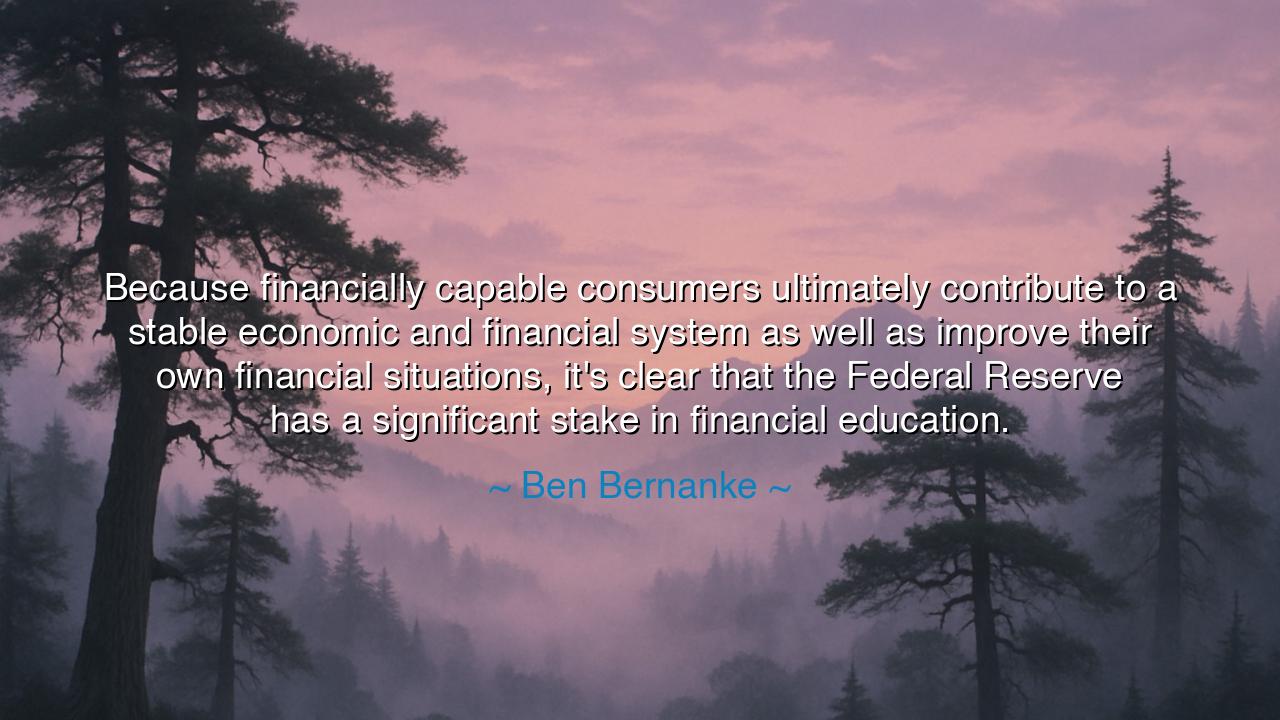
Because financially capable consumers ultimately contribute to a
Because financially capable consumers ultimately contribute to a stable economic and financial system as well as improve their own financial situations, it's clear that the Federal Reserve has a significant stake in financial education.






"Because financially capable consumers ultimately contribute to a stable economic and financial system as well as improve their own financial situations, it's clear that the Federal Reserve has a significant stake in financial education." These words, spoken by Ben Bernanke, former Chairman of the Federal Reserve, shine like a beacon of economic wisdom in an age of uncertainty. They speak not merely of numbers and markets, but of the profound relationship between knowledge, stability, and freedom. Bernanke’s insight reminds us that the strength of a nation is not found in its vaults or stock exchanges, but in the minds of its people—in their ability to understand, manage, and sustain the flow of wealth that sustains their lives and their society.
To understand his words, we must see financial education not as a luxury, but as a necessity—a shield against chaos. When individuals know how to manage their resources, to save, to invest wisely, and to avoid reckless debt, they not only protect themselves but also reinforce the entire structure of the economy. The uneducated consumer is like a sailor adrift without compass or map; the financially capable one steers confidently through storms. Bernanke, who guided the United States through the Great Recession of 2008, saw firsthand how ignorance and greed could collapse the pillars of prosperity. He understood that the path to economic recovery and enduring stability begins not in the halls of government, but in the classrooms, the homes, and the daily decisions of ordinary people.
History itself provides testimony to this truth. In the years leading up to the Great Depression of 1929, few citizens understood the nature of credit or the risks of speculation. Millions borrowed and invested beyond their means, lured by the illusion of endless growth. When the markets fell, the unprepared were swept away in the flood of financial ruin. Yet from this tragedy arose a lesson that still echoes: that education—in finance as in life—is the foundation of resilience. Nations that teach their citizens how to understand money teach them how to survive and to rebuild. In contrast, those that neglect this duty sow seeds of instability that will one day reap the whirlwind.
Bernanke’s wisdom also reflects an ancient truth, known to philosophers long before the age of banks. The Greeks spoke of prudence—the virtue of foresight and measured action—as one of the cardinal pillars of wisdom. To live well, they said, one must understand not only philosophy and art but the stewardship of one’s household, the balance of giving and saving, of risk and restraint. The same principle guides economies today: for the household is the seed of the nation, and when each family governs its wealth wisely, the nation itself stands firm. Financial education, then, is the modern expression of this timeless virtue—a form of collective prudence that ensures both personal prosperity and public peace.
Consider the story of Japan in the aftermath of World War II. The nation lay in ruins, its economy shattered. Yet through a deep cultural emphasis on thrift, discipline, and financial literacy, Japan transformed itself within a generation into one of the world’s leading economies. Its people saved diligently, invested carefully, and built industries rooted in foresight and precision. Their recovery was not merely material—it was moral and intellectual, born of a shared understanding that economic strength begins with personal wisdom. Bernanke’s quote echoes this same belief: that stability is not decreed by leaders alone but cultivated by the wisdom of the people.
Yet in modern times, many have forgotten this sacred connection. In an age of credit cards and digital transactions, too many live in a fog of illusion, mistaking access to debt for wealth, and consumption for prosperity. Without financial education, they become prisoners of systems they do not understand—working endlessly, yet never truly free. Bernanke’s words ring like a warning bell to the world: that when people lose control of their finances, they lose control of their destinies. And when enough citizens fall into that bondage, the whole structure of the economy trembles, for no nation can stand upon the ignorance of its people.
Let this, then, be the teaching for all who would build strong lives and strong societies: learn to master money before it masters you. Let financial education be taught as one teaches virtue—patiently, consistently, and with reverence for its power. Teach children the value of saving, the meaning of debt, and the miracle of compounding growth. Let every household become a fortress of understanding, every citizen a steward of stability. For as Ben Bernanke declared, a nation of financially capable consumers is a nation fortified against crisis, rich not only in wealth but in wisdom. And when the people are educated, the markets are steady, and the future, though uncertain, will always be theirs to command.






AAdministratorAdministrator
Welcome, honored guests. Please leave a comment, we will respond soon